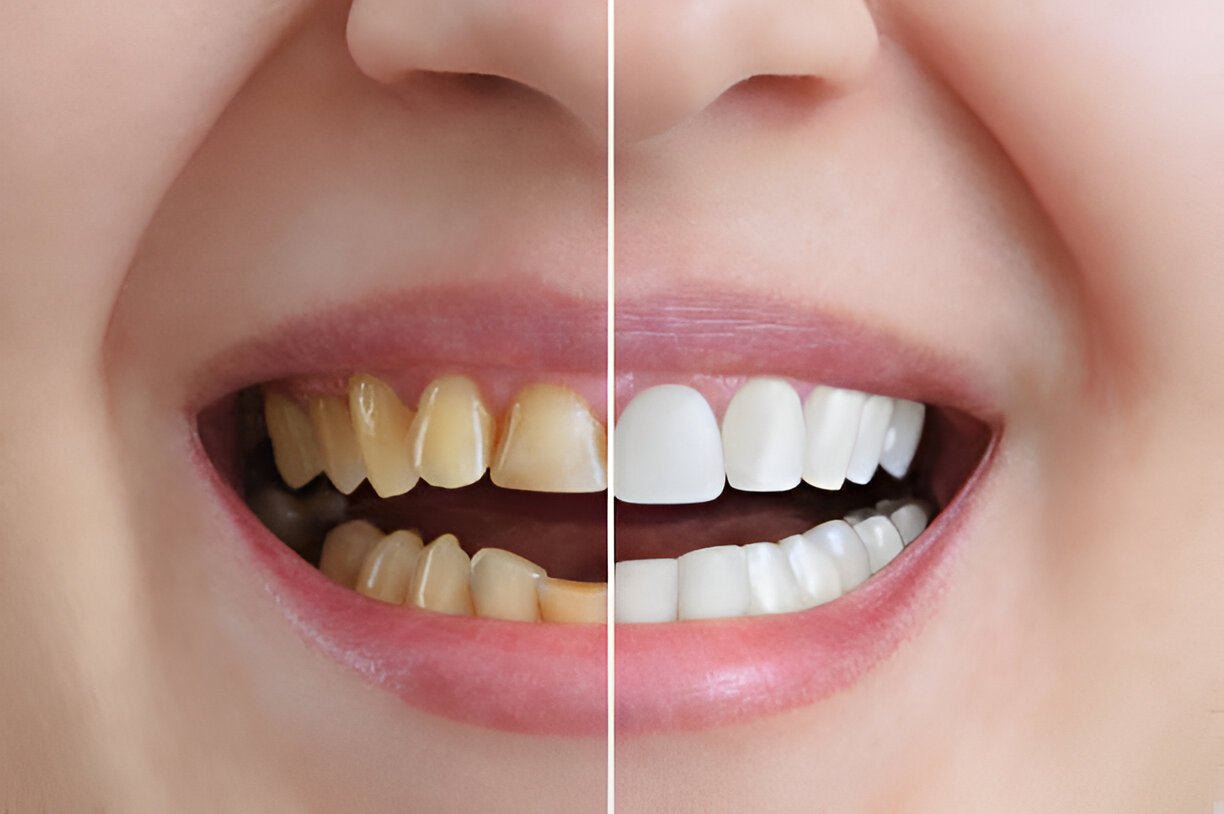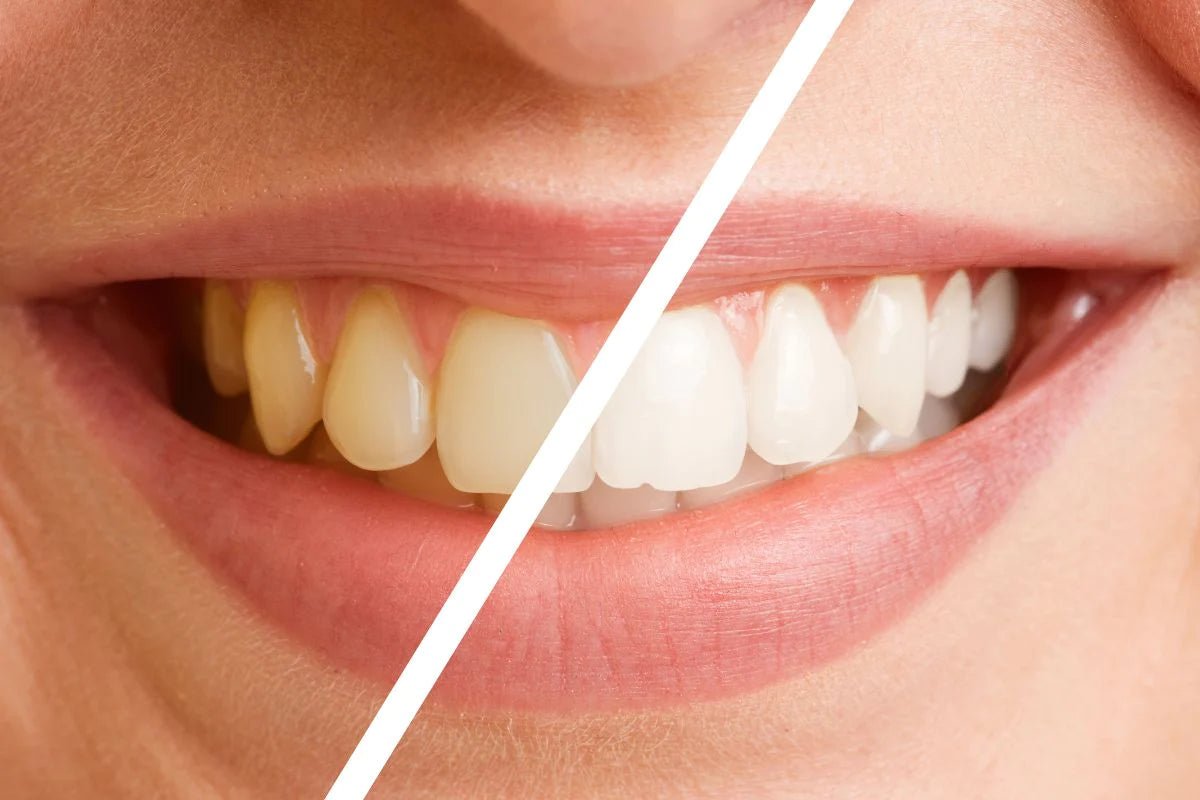Best Teeth Whitening Options
for People With Sensitive Teeth

Do you fear tooth sensitivity might stop you from achieving those pearly white teeth?
Have you ever tried whitening your teeth at home but ended up having sore gums or feeling sharp pain or discomfort in one or more teeth?
You’re not alone.
Based on a study, it is estimated that around 10 % of patients who underwent teeth whitening may encounter moderate sensitivity, while approximately 4 % of patients may experience severe sensitivity lasting for one to two weeks.
If you already have sensitive teeth, teeth whitening can be a bigger challenge.
While patients normally experience whitening-induced tooth sensitivity, it is highly manageable.
With the knowledge of its causes and the various professional whitening options available, you don’t have to worry about tooth sensitivity.
What causes tooth sensitivity during teeth whitening procedures?
A study found that one in every eight people in America has dentin hypersensitivity or tooth sensitivity. Similarly, a study conducted on 1000 French found that 38% of the participants reported experiencing tooth sensitivity, making it a relatively common oral problem in France.
But what exactly is tooth sensitivity? And why does it occur during or after teeth whitening procedures?
It is still unclear what exactly triggers teeth sensitivity after undergoing treatment. Nonetheless, the primary explanation centers around the impact of peroxides on both the enamel and dentin. Peroxide products used in the whitening process eliminate stains on the teeth while causing a minor demineralization that increases the porosity of the teeth.
Aside from the bleaching solution impacting the enamel and dentin, tooth sensitivity can be associated with the following:
Gum recession
When your gums recede, the roots of your teeth become exposed, making them more sensitive to hot or cold food and bleaching solutions.
Gum recession can be caused by various factors, including gum disease, hormonal changes, aging, and tobacco use. You can prevent gum recession by brushing your teeth twice daily with a soft-bristled toothbrush, flossing daily, and using fluoride mouthwash. You should also avoid habits like smoking that can damage your gums.
Enamel erosion
The enamel or the hard outer layer protecting your teeth from damage and decay can erode over time. When the sensitive dentin layer beneath it becomes exposed, it leads to tooth sensitivity.
Enamel erosion can also be caused by consuming acidic foods and drinks, brushing too hard, and certain medical conditions. Medical conditions like acid reflux and bulimia can contribute to enamel erosion.
Cavities
Cavities create a sticky film called plaque that coats the teeth and leads to tooth enamel breakdown. It will then make a hole in the tooth that exposes the sensitive inner layers, including the dentin and pulp.
In addition to the pain and discomfort, cavities can lead to further tooth decay, requiring extensive treatment such as tooth extraction and root canal.
The abovementioned data cannot be taken from medication guides inside at-home-teeth-whitening solutions. Despite the demand for industry-approved teeth whitening products, it’s still strictly advised to seek advice from dental professionals.
In that way, you’ll be able to equip yourself with essential knowledge about the entire process, including the possible causes of tooth sensitivity in teeth whitening.
That said, here’s everything you need to know about professional teeth whitening options.
Having Problems With Tooth Sensitivity?
Professional Teeth Whitening Options for Sensitive Teeth
Is it even possible to whiten your teeth if you’re already suffering from tooth sensitivity?
The short answer is yes.
Historically, dentists often discouraged teeth whitening for patients with tooth sensitivity. Nevertheless, the advent of advanced teeth whitening techniques and procedures has made it possible for people with tooth sensitivity to have a brightened smile.
From in-office professional teeth whitening to at-home professional teeth whitening (e.g., customized trays, strips, and solutions), there is a variety of options to choose from even if you have sensitive teeth.
Let’s explore them one by one.
Laser teeth whitening
Laser teeth whitening is a famous professional tooth whitening option that uses a specialized laser and gel made of hydrogen peroxide to whiten the teeth. The laser's heat and light energy help break down stains and discoloration on the teeth, making them 7 to 10 shades whiter.
A study on the efficacy of laser-assisted in-office bleaching and home bleaching shows the superiority of the previous option over the latter.
It is also not invasive, thus, more recommended for people with sensitive teeth. It usually takes an hour to finish the treatment and is generally done once every year.
The average cost of a laser teeth whitening treatment in the United States ranges from $400 to $800 (or more). In California, for instance, this treatment can cost around $6000 to $1800.
The quantity of treatment and cost required is determined by the extent of discoloration present on your teeth, as it affects both the technique and the quantity of gel that is applied to your tooth enamel.
While laser teeth whitening is considered the most expensive option, it's the most effective and reliable choice.
Custom teeth whitening trays
During this procedure, your dentist creates an impression of your teeth using custom whitening trays. The trays are then filled with a gel containing a high concentration of hydrogen peroxide, allowing for a more uniform and natural-looking result.
Customized trays and whitening mixtures are better than over-the-counter trays and whitening solutions. Custom-fit trays prevent the whitening solution from spilling, which avoids gums and tongue irritation. Like other procedures that can whiten your teeth, it is also non-invasive, making it a better option for those with sensitive teeth.
The recommended duration for wearing the whitening trays is one to two weeks, two to four hours daily. Custom trays are cheaper compared to an in-office laser teeth whitening treatment. Its average cost is $150 to $600.
Dentist-supervised at-home whitening kits/strips
Dentist-supervised at-home whitening kits or strips are a type of teeth whitening treatment that allows patients to whiten their teeth in the comfort of their homes while still under the supervision of a dentist. These whitening strips and kits contain a professional-grade whitening gel for custom-made trays or pre-made strips. Patients wear whitening strips twice daily, typically for 30 minutes to a few hours, as their dentist recommends. While whitening kits are used for 6 to 10 hours, ideally overnight.
Whitening strips and kits can be beneficial for people with sensitive teeth as they offer gradual whitening, lower concentrations of whitening agents, and sometimes contain desensitizing agents such as potassium nitrate or fluoride. These ingredients can help to reduce sensitivity during and after the whitening process.
The average cost of this procedure is $150 to $600.
Are alternative teeth whitening methods good for sensitive teeth?
You may be wondering if there are any natural ways to whiten your teeth without causing more discomfort. You may have heard of some home remedies that claim to whiten teeth, such as charcoal toothpaste, oil pulling, and baking soda. But do they work? And are they safe for your teeth?
Before you try these methods, it's essential to know that there is no conclusive scientific evidence pointing to their suitability and effectiveness for people with sensitive teeth. In fact, some of these alternative teeth whitening methods can damage your enamel or gums if used too often and incorrectly.
To know them better, let’s dig deeper into these popular alternative teeth whitening products and procedures.
Charcoal Toothpaste
Charcoal toothpaste contains activated charcoal, a highly porous form of carbon that has been processed to make it more absorbent. It is marketed as a natural and effective way to whiten teeth and improve oral health. However, there is limited scientific evidence to support the claims made by manufacturers.
Furthermore, some studies suggest that the abrasive nature of activated charcoal may harm tooth enamel, leading to sensitivity and other issues. Additionally, there are concerns regarding ingesting charcoal toothpaste and its potential interactions with certain medications.
It is recommended to consult with a dentist before using charcoal toothpaste or any new oral care product. Dentists can offer professional advice on the safety and effectiveness of such products and recommend alternative options for achieving desired results.
Oil Pulling
Oil pulling is a traditional Ayurvedic used to promote oral hygiene, which involves swishing oil in the mouth for a few minutes. Some people believe oil pulling can also help whiten teeth, as it is thought to remove surface stains and promote oral health. However, studies found limited scientific evidence to support these claims, and the effectiveness of oil pulling in whitening your teeth remains questionable.
While oil pulling is generally considered safe, it should not be used as a substitute for regular brushing and flossing. It is also essential to choose the right type of oil for oil pulling, such as coconut, sesame, or sunflower oil, and follow proper techniques to avoid causing any damage to the teeth and gums.
In conclusion, oil pulling may benefit teeth whitening and oral health, but further research is needed to support these claims. Therefore, you should consult with your dentist before trying oil pulling and continue to prioritize regular brushing and flossing to maintain good oral health.
Baking Soda
Baking soda is a standard household product that has gained popularity for its ability to whiten teeth. It's a mild abrasive that can remove surface stains and plaque buildup from teeth, leading to whiter teeth. A study also found that dentifrices with baking soda effectively remove plaque. Additionally, baking soda is alkaline, which helps neutralize acids in the mouth and prevent tooth decay.
However, it's important to use baking soda cautiously, as excessive use can cause damage to tooth enamel and gums. It's recommended to mix baking soda with water to form a paste and brush gently for a minute or two, only a few times a week.
While baking soda can be an effective way to whiten teeth, it may not suit everyone. Baking soda has an alkaline pH, which can help to neutralize acidic substances in the mouth that contribute to tooth discoloration. However, using baking soda too frequently or in too high of a concentration can disrupt the natural pH balance of the mouth, leading to issues like dry mouth or an increased risk of cavities.
Some people may also be allergic to baking soda or experience irritation or inflammation of the gums or other soft tissues in the mouth when using it for teeth whitening.
Conclusion
Many people dream of having a whiter and glowing smile. While it's achievable, it can be challenging for those with sensitive teeth.
Luckily, there are professional teeth whitening options tailored for people suffering from sensitive teeth. These options use lower concentrations of bleach and ensure protective measures minimizing discomfort and sensitivity during and after treatment.
You also learned that there are cheaper alternative teeth whitening methods (e.g., charcoal toothpaste, oil pulling, and baking soda). However, we highlighted the fact that no substantial evidence supports the reliability and overall safety of these alternative teeth-whitening solutions.
Remember, before trying any teeth whitening treatment, it's crucial to consult with your dentist. It’s vital to have someone to help you determine the best approach for your specific dental cosmetic needs.
With proper care and guidance, you can achieve a shinier, healthier smile while addressing your tooth sensitivity issues.
Professional Teeth Whitening Treatments in Culver City
Are you a resident of Culver City or nearby areas such as Marina Del Rey, Inglewood, or Santa Monica? Are you also struggling with sensitive teeth but still want to achieve a brighter smile? Discover the best option for teeth whitening with Culver City Dentist United Dental Care, your go-to dental office for gentle and effective teeth whitening services.
Trust us to provide the best teeth whitening solutions. Our experienced team understands the importance of sensitive teeth care and can help you achieve a more confident smile.
Don't let sensitivity hold you back from getting that pearly white teeth. Contact us today to schedule an appointment at our office located at 3909 South Sepulveda Blvd, Culver City, CA.






